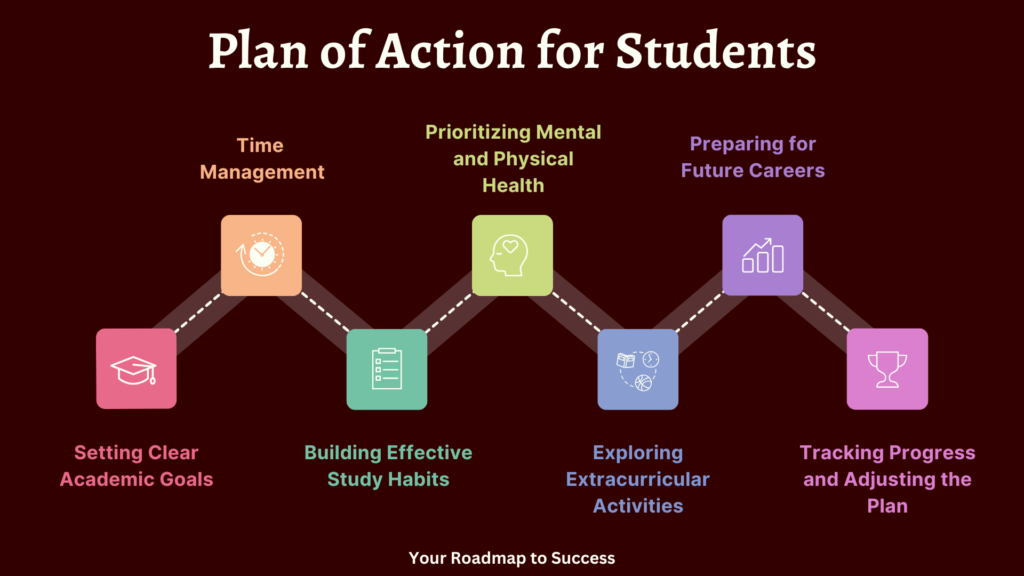Have you ever heard people say you should always have a plan for anything?
If you are a student, someone must have asked you, “What is your plan after you are done with school?”
And you must have told them about your goals and aspirations and how eager you are to fulfill them.
Having goals and aspirations to achieve something is a “plan”.
How you are going to achieve this is your “plan of action”.
Plan and plan of action are closely related but differ in scope and detail.
Here’s how they compare:
What is a Plan?
A plan is a general blueprint or outline that defines the strategy or approach toward achieving a certain goal or objective. It provides an overview of what needs to be done, but it might not go into the specific, actionable steps.
A plan typically includes:
- Objectives: The end goals or outcomes you want to achieve.
- Resources: The materials, tools, or people required.
- Timeline: A rough time frame or deadline for achieving the goal.
- Strategy: A general approach to reaching the objectives.
For example, a student might create a plan to improve their grades by studying more and attending extra classes. The plan gives direction but doesn’t necessarily detail how and when each step will happen.
What is a Plan of Action?
A plan of action is more detailed and focused than a general plan. It breaks down the broader strategy into specific, actionable steps. It not only outlines “what” needs to be done but also specifies “how,” “when,” and “by whom“ each task will be completed.
A plan of action typically includes:
- Specific Actions: Detailed tasks or steps required to meet each objective.
- Deadlines: Clear deadlines for each task or phase of the plan.
- Assignment of Responsibilities: Who is responsible for completing each task.
- Resource Allocation: Defining exactly how resources will be used for each action.
- Monitoring and Evaluation: How progress will be tracked and how the plan will be adjusted if needed.
For instance, if a student wants to improve their grades, a plan of action would specify how many hours per day they will study, what subjects to focus on, when to attend tutoring sessions, and how they will track their progress.
Key Differences
- A plan provides an overview and is broad in nature, focusing on the “what” and “why.”
- A plan of action is more detailed and focused on the “how” and “when,” outlining specific tasks and deadlines.
A plan sets the direction, while a plan of action puts that direction into practice through detailed, actionable steps.
Plan of Action for Students: Your Roadmap to Success
These days students are truly experiencing pressure to do well at academics, all while juggling extracurriculars, hobbies, social life, and personal growth.
Without direction, this may be overwhelming.
It’s really important for students to have a solid plan and put it into action. It helps them stay focused, manage their time better, and reach their goals.
This article discusses a comprehensive plan of action for students to help them in their academic performance, time management, health, and career preparedness.
These measures will help you through high school, college, and beyond.

1. Setting Clear Academic Goals
Setting clear academic goals is the foundation of any effective plan of action.
Without defined objectives, students can easily drift through their studies without direction, leading to poor performance and a lack of motivation.
Establishing specific, measurable, attainable, relevant, and time-bound (SMART) goals gives you a target to aim for and a roadmap to follow.
– How do I set up academic goals?
There are two types of goals students should focus on: short-term and long-term.
- Short-term goals are those that can be achieved within a few days, weeks, or months. Examples include:
- Improving grades in a specific subject by 10% within the next grading period.
- Completing all assignments on time for the next month.
- Participating actively in class for the remainder of the semester.
- Long-term goals are broader and require more time to accomplish.
Examples include:- Getting into your dream university.
- Earning a scholarship for academic excellence.
- Graduating with honors or a certain GPA.
– How to Break Big Goals into Smaller Tasks
To make your goals more achievable, break them into smaller, actionable steps.
For instance, if your long-term goal is to improve your GPA by the end of the year, your short-term actions could include:
- Studying an extra hour every day.
- Meeting with your teachers for feedback after exams.
- Joining a study group to review challenging subjects.
Breaking down goals into smaller tasks makes them feel less overwhelming and keeps you motivated as you hit milestones along the way.
2. Time Management: Mastering Your Schedule
As a student, managing your time effectively is one of the most important skills you can develop.
Between attending classes, studying for exams, participating in extracurricular activities, and maintaining a social life, it’s easy to feel overwhelmed.
Learning how to manage your time ensures that you stay on top of your academic responsibilities while still having time for relaxation and personal growth.
– How do I manage time and increase productivity?
Start by identifying all of your commitments, like class hours, study sessions, extracurricular activities, and personal time.
Once you have a clear picture of your weekly responsibilities, create a schedule that allocates time for each activity.
Make sure to prioritize important tasks and assign more time to subjects that require extra attention.
Here’s an example of how to structure your schedule:
- Morning: Review notes and prepare for the day’s classes.
- Afternoon: Attend classes or complete assignments.
- Evening: Dedicate time to extracurricular activities, socializing, or exercise.
- Night: Study for exams, review the day’s lessons, and prepare for tomorrow.
Read our guide to learn more about how to track your time and get things done:
Tools for Time Management
There are many tools available to help students stay organized and manage their time effectively. Some of the most popular include:
- Google Calendar: A versatile tool for scheduling and setting reminders for classes, assignments, and extracurricular activities.
- Todoist: A task management app that helps you organize your to-do list and track deadlines.
- Trello: A visual project management tool perfect for organizing group projects or personal study plans.
Using these tools can help you stay on track and ensure that you never miss a deadline.
3. Building Effective Study Habits
Your study environment plays a huge role in how effectively you can focus and retain information.
Ideally, you should have a dedicated study space that is free from distractions, well-lit, and organized.
This space should include all the materials you need to study like books, notebooks, pens, a computer, and anything else relevant.
These are the basics of effective study habits.
Active learning is a method that requires students to engage with the material rather than passively reading or memorizing. Some active learning techniques include:
- Note-Taking: Writing down key points in your own words helps reinforce the information.
- Summarizing: After reading a chapter or attending a lecture, summarize the content in a few sentences. This helps to consolidate your understanding.
- Teaching Others: Explaining concepts to someone else helps solidify your understanding and reveals any areas where you need further clarification.
Consistency and Avoiding Procrastination
Consistency is the key to academic success. Rather than cramming for exams or rushing to complete assignments at the last minute, develop a consistent study routine. This allows you to absorb the material over time and reduces stress before major deadlines.
To avoid procrastination, break your tasks into manageable chunks and reward yourself for completing them.
For example, after studying for one hour, take a 10-minute break to relax or do something enjoyable.
4. Prioritizing Mental and Physical Health
It’s easy to get caught up in the demands of school and forget about your mental and physical well-being.
However, neglecting your health can lead to burnout, poor academic performance, and a lack of motivation.
Prioritizing your mental and physical health is just as important as your academic goals.
Mindfulness and Mental Health
Incorporating mindfulness practices into your daily routine can help reduce stress and improve focus.
Mindfulness involves being present in the moment and paying attention to your thoughts and feelings without judgment.
Techniques like meditation, deep breathing, or journaling can help you manage stress and stay centered.
If you’re feeling overwhelmed, don’t hesitate to seek help. Whether it’s talking to a trusted friend, counselor, or therapist, reaching out can provide the support you need to manage stress and anxiety.
Exercise and Physical Health
Physical activity is essential for both your mental and physical well-being. Regular exercise has been shown to improve mood, boost energy levels, and increase focus.
Whether it’s going for a walk, joining a sports team, or practicing yoga, find an activity you enjoy and make it a regular part of your routine.
Moreover, for your body and mind to continue working at their peak, eating a balanced diet and getting adequate sleep are essential.
5. Exploring Extracurricular Activities
Extracurricular activities are an important part of a well-rounded education.
Not only do they provide opportunities for personal growth, but they also help students develop important skills like teamwork, leadership, and time management.
Participating in extracurriculars can also make you a more attractive candidate for college applications or future job opportunities.
Choosing the Right Activities
It’s important to choose extracurricular activities that align with your interests and goals. If you’re passionate about writing, consider joining the school newspaper. If you’re interested in science, look for clubs or competitions that focus on research and experimentation. The key is to find activities that excite you and help you develop new skills.
Balancing Extracurriculars with Academics
While extracurricular activities are important, it’s essential to find a balance between them and your academic responsibilities. Make sure your schedule allows enough time for studying and completing assignments. If you’re struggling to find that balance, consider scaling back on activities that are less important to your long-term goals.
6. Preparing for Future Careers
It’s never too early to start thinking about your future career. By exploring different career paths, you can identify what interests you and start building the skills you need to succeed in that field.
Internships, job shadowing, and part-time jobs are all great ways to gain experience and learn more about potential careers.
The Role of Online Courses and Certification
In addition to your regular studies, consider taking online courses or earning certifications in areas that interest you.
Websites like Coursera, Udemy, and LinkedIn Learning offer a wide variety of courses on topics ranging from coding to digital marketing.
These courses can help you develop valuable skills that will set you apart in the job market.
Networking and Mentorship
Building a professional network is crucial for career success. Start by connecting with your teachers, alumni, and industry professionals in your field of interest.
Networking events, career fairs, and online platforms like LinkedIn are great places to meet people who can offer guidance and support.
Having a mentor can also be incredibly valuable. A mentor is someone who has experience in your field and can provide advice, feedback, and encouragement as you work toward your career goals.
7. Tracking Progress and Adjusting the Plan
Reviewing Goals Regularly
Your plan of action should be flexible and adaptable to changing circumstances. It’s important to review your goals regularly to assess your progress and make adjustments as needed.
Set aside time each month to reflect on what’s working, what’s not, and what you can do to improve.
Making Adjustments When Challenges Arise
Challenges are inevitable, but how you respond to them will determine your success.
If you find that certain strategies aren’t working, don’t be afraid to try something new. Whether it’s adjusting your study routine, seeking extra help from a teacher, or re-evaluating your extracurricular commitments, making adjustments is a normal part of the process.
Celebrating Successes Along the Way
Finally, it’s important to celebrate your achievements, no matter how small they may seem. Recognizing your progress can help keep you motivated and remind you that your hard work is paying off.
Whether it’s completing a difficult assignment, earning a high grade on an exam, or achieving a personal milestone, take time to celebrate your successes.
Conclusion
Students who want to do well in school, in their daily lives, and in their careers need to make a plan of action. Setting clear goals, using your time wisely, making good study habits, and putting your health first will help you go through school with confidence and a sense of purpose.
Remember that your plan should be adaptable and open so that you can change it as you do.
Start today, and take control of your future!




